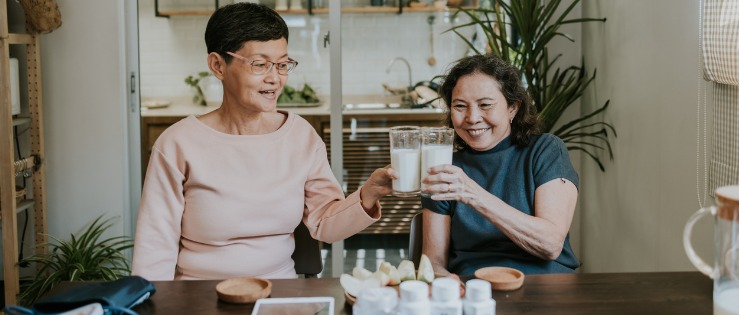
Our bones form our physical structure, they hold us upright and keep us moving. When bone density is low, the condition is called osteopenia and when it’s more severe, it’s known as osteoporosis and puts you at greater risk of a fracture.
Osteoporosis tends to occur in certain parts of the body, such as the hip, spine and wrist. It’s estimated over 1 million Australians have osteoporosis and two thirds of people over 50 have osteoporosis or osteopenia.
An all-round healthy diet is recommended for bone health, but there are a few specific nutrients we need to focus on.
Calcium
The main ingredient of bone is a mineral called calcium. Our body also needs it for muscle, heart and nerve function. Our body doesn't make calcium so we must get it from our diet. If there isn't enough calcium in our blood, our body will pull it from our bones. If there isn’t enough calcium from the diet to replace it, over time, bones become thin and brittle, leading to osteoporosis.
The recommended intake for adults for calcium is 1,000mg until the age of 50, then women’s requirements go up to 1,300mg per day after menopause. It is recommended to have 3-4 serves of high calcium foods per day to meet requirements.
1 serve of calcium =
1 cup (250mL) dairy milk or calcium-fortified plant milk
200g tub of dairy yoghurt
2 slices (40g) cheese
1/2 cup fresh cheese (such as cottage cheese)
Vitamin D
Vitamin D has many functions in the body but one of its main jobs is that it helps our gut absorb calcium from our diet.
Our most efficient source of vitamin D is from sun exposure, where it stores it in the oils in our skin and is then absorbed into our blood stream, however with the concern about skin safety, many people have become deficient in vitamin D.
Other lesser sources of vitamin D include fatty fish, milk and eggs but in many cases it is simply safer to take a vitamin D supplement, so speak to your health care professional about what is recommended for you.
Protein
Protein acts like the scaffolding for bone, that calcium and other bone forming minerals connect to and harden to create bone.
The good news is dairy foods that are rich in calcium are also a naturally good sources of protein. Other sources include all meat, fish and seafood, as well as pulses, nuts and seeds.
The protein recommendations for adults is a minimum of 0.8g of protein per kilogram of body weight. So for example, a female who weighs 70kg should have at least 56g protein per day.
Exercise
Weight bearing and resistance exercise is essential as it puts the bone under stress and helps it to rebuild.
There are foods and drinks that may impact our bone health, such as too much salt, foods high in oxalates and phytates (green leafy veggies, pulses and wheat bran – don’t avoid them, soak them before use), alcohol, caffeine and soft drinks.